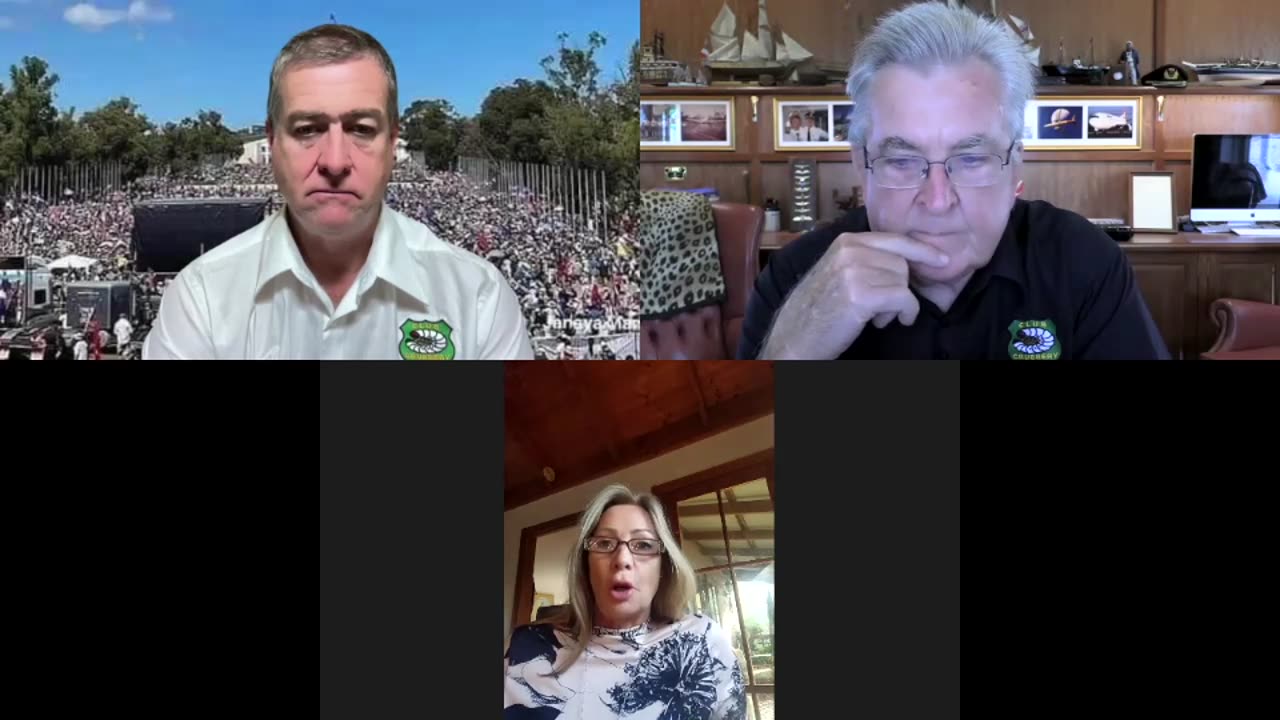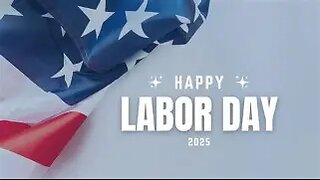Premium Only Content

Graham and John speak with Jacquie Dundee...
Tonight on Club Grubbery.
Eighty year old twins fighting medical tyranny.
Taking on the High Court of Australia is Dr Beverley Peers and she may just pull this off.
Ably assisted by volunteers like Jacquie Dundee, octogenarian Dr Beverly might just confound the highly paid legal profession by taking her case to the full bench.
Are we in for another "Castle moment."
You just couldn't make this stuff up.
Please support Beverly through the links below.
Tomorrow Night.....From the US Senator Ron Johnson.
God bless.
Hoody and Johnny.
https://www.givesendgo.com/GCKKU
H I G H C O U R T O F A U S T R A L I A
NOTICE OF FILING
This document was filed electronically in the High Court of Australia on 18 Feb 2025 and has been accepted for filing under the High Court Rules 2004. Details of filing and important additional information are provided below.
Plaintiff C6/2025
Page 1
IN THE HIGH COURT OF AUSTRALIA CANBERRA REGISTRY
C6/2025
BETWEEN: Beverley Peers
Plaintiff
and
Eastern Health First Defendant
and
The State of Victoria Second Defendant
STATEMENT OF CLAIM
To: Eastern Health
and
The State of Victoria
Constitutional basis for enlivening this Courts original jurisdiction
1. This is a matter arising under s76(i) of the Constitution pursuant to s109 and s51(xx) of the Commonwealth Constitution and also pursuant to s76(ii) arising under a federal act the Fair Work Act 2009 (Cth) which both enliven this Courts original jurisdiction.
Background
2. I was employed as a VMO Anaesthetist at Box Hill Hospital since February 1981 (by Eastern Health) and I was terminated on 8 December, 2022 for serious misconduct for not revealing my vaccination status or medical history.
3. My employer Eastern Health, ABN 68 223 819 017 the first defendant appears to rely upon Pandemic (Workplace) Order 2022 (No.1-10) made under s165AI of the Public Health and Wellbeing Act 2008 (Vic), the practical operation or substance of the act to prevent me
attending my place of employment (or working outside my ordinary place of residence) as its employee, absent proof of vaccination status.
4. I am not seeking reinstatement of employment or compensation from my former employer instead I am seeking the High Courts declaratory relief about the State of Victoria exceeding their legislative powers and the employer being a constitutional trading corporation also
exceeding their authority by relying on those public health orders or their own policy instead of the federal act.
5. As a matter of law my employer was required to apply the federal Act the Fair Work Act 2009 (Cth) (FWAct) in preference to the state act the Public Health and Wellbeing Act 2008 (Vic) (PHWAct). Eastern Health has erroneously applied the state act, the PHWAct in
preference to a federal or national law, the FWAct, the latter governing the relationship
between a constitutional trading corporation and its employees. The state act is invalid by reason of section 109 of the Constitution by both a direct and indirect inconsistency.
6. This matter has general application as all the states and territories have similar legislation that in their practical operation or substance which operated as state industrial relations laws where a person could not go to work unless they could provide proof of Covid-19
vaccination. So every employee in the country would want to know which act governs them either the state or federal act and thus there is great public interest and general application in the answer to that question.
The relationship between the employer and the state of Victoria as defendants in the matter
7. The state of Victoria the second defendant imposed a financial penalty upon employers for allowing employees to enter into the workplace without proof of vaccination status. The first defendant Eastern Health the employer failed to comprehend or erroneously believed that the relationship between itself and its employees was regulated by the state act the PHWAct
whereas in actual fact the relationship was governed or regulated by the federal act the FWAct
to the exclusion of the state act. The State of Victoria trespassed upon the alien field of
regulation of state industrial relations as such a field was exclusively regulated by a federal act the FWAct and therefore the directions made under the PHWAct requiring proof of
vaccination prior to commencing or continuing the employer employee relationship is ultra vires the state and rendered that State act invalid or inoperable by reason of s109 of the
Constitution.
The binding force of a federal act over any state act
8. The FWAct is binding over the PHWAct and the corporation Eastern Health by reason of Clause 5 and s106 of the Constitution. Isaacs J in Attorney General for Queensland v The Commonwealth (1915) HCA made this point clear when he stated below:
“In the Constitution itself, we find sec. 106 declaring that the State
Constitution is to be “subject to this Constitution”; that is State powers are to give way to the requirements of the Federal Constitution. If they are repugnant to that Constitution, then they pro tanto cease to exist.
If there still exists a State power of legislation, it may be exerted, but with the consequence expressed in sec. 109 that wherever it is found to be inconsistent with a law of the Commonwealth it is pro tanto invalid. I draw attention to the word invalid.
And then, in covering sec. V. of the Constitution Act itself, that Act (which includes the Constitution), and all Commonwealth laws made under it, are to be binding on the Courts, Judges and people of every State and of every part of the Commonwealth, notwithstanding anything in
the laws of any State. In other words, there is no law possible which a State may pass which can affect the validity and binding force of a
Commonwealth law supported by the Constitution”. (Emphasis added)
9. This above principle of constitutional law that all state acts are made subject to the
Constitution and subservient to the binding force of a federal act notwithstanding anything in the laws of any state was further cited in Kable v Director of Public Prosecutions (NSW) (1996) HCA by Gaudron J at [11]
11. Neither the recognition in Ch III that State courts are the creatures of the States nor its consequence that, in the respects indicated, the
Commonwealth must take State courts as it finds them detracts from what is, to my mind, one of the clearest features of our Constitution, namely, that it provides for an integrated Australian judicial system for the exercise of
the judicial power of the Commonwealth. Moreover, neither that recognition nor that consequence directs the conclusion that State
Parliaments may enact whatever laws they choose with respect to State courts. If Ch III requires that State courts not exercise particular powers, the Parliaments of the States cannot confer those powers upon them. That follows from covering cl 5, which provides that the Constitution is "binding on the courts, judges, and people of every State and of every part of the Commonwealth, notwithstanding anything in the laws of any State", and from s106, by which the Constitution of each State is made subject to the Australian Constitution. And so much was recognised in The Commonwealth v Queensland (162) where it was said that State legislation in violation of "the principles that underlie Ch III" is invalid’’. (Emphasis added).
10. The test for applying s109 binding on this Court is set out in the following passage from Work Health Authority v Outback Ballooning Pty Ltd (2019) HCA at [32]-[34], where Kiefel CJ, Bell, Keane, Nettle and Gordon JJ stated:
32. The first approach has regard to when a State law would "alter, impair or detract from" the operation of the Commonwealth law. This effect is often referred to as a "direct inconsistency"[47]. Notions of "altering", "impairing" or "detracting from" the operation of a
Commonwealth law have in common the idea that a State law may be said to conflict with a Commonwealth law if the State law in its operation and effect would undermine the Commonwealth law[48]. (Emphasis added)
33. The second approach is to consider whether a law of the
Commonwealth is to be read as expressing an intention to say "completely, exhaustively, or exclusively, what shall be the law governing the particular conduct or matter to which its attention is directed"[49]. This is usually
referred to as an "indirect inconsistency". A Commonwealth law which expresses an intention of this kind is said to "cover the field" or, perhaps more accurately, to "cover the subject matter" with which it deals[50]. A Commonwealth law of this kind leaves no room for the operation of a State or Territory law dealing with the same subject matter. There can be no question of those laws having a concurrent operation with the Commonwealth law[51]. (Emphasis added)
34. The question whether a State or Territory law is inconsistent with a Commonwealth law is to be determined as a matter of construction. In a
case where it is alleged that a State or Territory law is directly inconsistent with a Commonwealth law it will be necessary to have regard to both laws and their operation. Where an indirect inconsistency is said to
arise, the primary focus will be on the Commonwealth law in order to determine whether it is intended to be exhaustive or exclusive with respect to an identified subject matter. (Emphasis added)
The Public Health and Wellbeing Act 2008 (Vic) is invalid by reason of direct and indirect inconsistency pursuant to s109
11. Kiefel CJ, Bell, Keane, Nettle and Gordon JJ in Work Health Authority v Outback Ballooning at [32]-[34] and further cited in Kassam v Hazzard (2021) NSWSC at [290]
explained that two kinds of inconsistency may arise under section 109, direct and indirect inconsistency. My case gives rise to both a direct and indirect inconsistency between the FWAct and the PHWAct.
12. The PHWAct is directly inconsistent with the FWAct because it alters, impairs or detracts from the operation of the federal act, the FWAct where the latter can have no operation unless the former is first satisfied. There can be no employer-employee
relationship for the FWAct to regulate unless the employee can first provide proof of
vaccination status commanded by the state act. In this sense the states have determined the limits of federal power which is ultra vires the states (see French CJ, Hayne, Keifel, Bell, Keane and Nettle JJ at [28] in Communications, Electrical, Electronic, Energy, Information, Postal, Plumbing and Allied Services Union of Australia v Queensland Rail (2015) HCA,
“Queensland Rail”).
13. An indirect inconsistency under section 109 of the Constitution also arises pursuant to section 26 of the FWAct where the Commonwealth has expressly stated its intention that no state industrial law can have concurrent operation with the FWAct. In other words, the Commonwealth has “covered the field” or subject matter of industrial relations. The state
act, the PHWAct in its practical operation or substance operates as a state industrial relations law because it applies generally to all employers and employees in the State and provides for the establishment or enforcement of terms and conditions of
employment by way of the health order requirement proof of vaccination status for employment and is therefore invalid by reason of indirect inconsistency pursuant to section 109 of the Constitution.
14. Section 26 of the FWAct is where the Commonwealth expressly states its intention to
cover the field or subject matter of industrial relations to the exclusion of any state act. Given that the Commonwealth has expressly stated its intention to cover the field at s26 of the
FWAct the text is therefore conclusive alike in what it directs and what it forbids. This
principle was stated by Lord Loreburn LC in Attorney General for Ontario v Attorney for Canada (1912) and further cited at [28] in Gerner v Victoria (2020) HCA. He stated: that “if the text is explicit the text is conclusive, alike in what it directs and what it forbids”.
15. Where a state law does purport to encroach on a “field” or area, or subject matter, which
the Commonwealth legislation intends to cover, then that intrusion will represent a conflict or inconsistency with the Commonwealth’s intention to “cover the field”, and a breach of s109 will arise as has happened in my case.
16. The state act, the PHWAct in its practical operation or substance operates as a state industrial relations law because it applies generally to all employers and employees in the State and provides for the establishment or enforcement of terms and conditions of
employment by way of the health order requirement proof of vaccination status for
employment and is therefore invalid by reason of direct inconsistency pursuant to section 109 of the Constitution.
17. In Wenn v Attorney-General for Victoria (1948) HCA at p110 this Court held a
Commonwealth act, the Re-establishment and Employment Act 1945 (Cth) validly used express words to exclude the operation of State laws from the field or subject matter of employment. Latham CJ stated:
“In the Commonwealth Act now under consideration, however, the
Commonwealth Parliament has not left this matter of Commonwealth intention to cover the field] to be determined by inference (possibly disputable) from the nature and scope of the statute. The Parliament has most expressly stated an intention which in the other cases mentioned was discovered only by a process of inference. If such a parliamentary
intention is effective when it is ascertained by inference only, there can be
no reason why it should not be equally effective when the intention is expressly stated”. (Emphasis added)
18. The PHWAct has achieved the same result an industrial relations law would, by regulating the employment relationship between a constitutional corporation as employer and its
employees, to the point it now determines if it is commenced, continued or terminated. The PHWAct in its practical operation or substance answers the description of an industrial relations law by compelling vaccination status to be disclosed for employment between a constitutional corporation and its employees. The state law is excluded from any
operational effect by section 26 of the FWAct. Such a state law, being an industrial law in its practical operation or substance, is prohibited by the federal act, the FWAct. There is no such permissible regulatory power on the part of the State, it is an exclusive power on the part of the Commonwealth to regulate a constitutional corporation and its dealings with its
employees and is exclusively exercised through the FWAct.
The constitutional principle or maxim of the practical operation or substance of an Act is an important concept that is relevant in this matter:
19. The principle or maxim of the practical operation or substance of an act and not just its mere form is an important guide to construction and indicates that guarantees or prohibitions such as section 26 of the FWAct and the health orders are concerned with substance not mere form (see Georgiadis v Australian and Overseas Telecommunications Corporation (1994) HCA at [13] cited below):
13. It is often said in relation to constitutional guarantees and prohibitions that "you cannot do indirectly what you are forbidden to do directly" ((16) Wragg v. State of New South Wales (1953) 88 CLR 353 at 387-388. See, with respect to s.51(xxxi), Bank Nationalization Case (1948) 76 CLR at 349-350; Attorney-General (Cth) v. Schmidt (1961) 105 CLR at 371. See,
generally, Grannall v. Marrickville Margarine Pty. Ltd. (1955) 93 CLR 55 at 78; Caltex Oil (Aust.) Pty. Ltd. v. Best (1990) 170 CLR 516 at 522-523.).
That maxim is, in fact, an important guide to construction, indicating that guarantees and prohibitions are concerned with substance not
form. (Emphasis added)
20. An act may expressly state something, for example in the exercise of a discretionary
power, but the practical operation or substance of the act may have an entirely different legal effect. Such is the case with the health orders compelling disclosure of vaccination status.
Although they may not expressly state that a person must be vaccinated to go work, but in their practical operation or substance that is the legal effect. The practical operation or
substance of the PHWAct, the orders made under it in the exercise of a discretionary power, can easily be determined by asking this one simple question:
Can a person go to work if not vaccinated? The answer is no and therefore that is the practical operation or substance of the act.
This constitutional principle of the practical operation or substance of the act allows the court to go beyond the mere drafting of an act or discretionary order to ensure the law is not
circumvented by mere drafting or expressly written provisions or orders made under the act.
21. The PHWAct in its practical operation or substance is a general law of quarantine in relation to the infectious disease Covid-19. The act has been given a further practical
operation in relation to the alien field of industrial relations, the relationship between a
constitutional corporation and its employees which is regulated by a national law, the FWAct and no other. This Act expressly excludes the operation of any state industrial relations law and therefore the state act has trespassed upon the alien field of industrial relations.
The PHWAct in its practical operation or substance is an industrial relations law because it applies to employment generally and provides for the establishment or enforcement of terms and conditions of employment. A person cannot be employed if not vaccinated. In Ha v New South Wales (1997) HCA the majority stated the principle of the practical operation or
substance of an act, citing Peterswald v Bartley:
“In considering the validity of laws of this kind we must look at the substance and not the form.” (Emphasis added)
22. Furthermore, the Court at [253] in Wong v Commonwealth (2009) HCA below citing Ha v New South Wales (1997) HCA at p498 reemphasised the importance or relevance of the
principle of the practical operation or substance of the act:
253. Relevance of practical operation. Secondly, in Ha v New South Wales
[268] Brennan CJ, McHugh, Gummow and Kirby JJ said:
“When a constitutional limitation or restriction on power is relied on to invalidate a law, the effect of the law in and upon the facts and
circumstances to which it relates – its practical operation – must be examined as well as its terms in order to ensure that the limitation or restriction is not circumvented by mere drafting devices. In recent cases, this Court has insisted on an examination of the practical operation (or substance) of a law impugned for contravention of a constitutional
limitation or restriction on power.” (Emphasis added)
23. Perhaps the earliest statement of the maxim or principle was stated by Isaacs J where he beautifully blends the concepts of form and substance and direct and indirect transgression in Commonwealth Oil Refineries further cited in Ha v New South Wales (1997) HCA. He states that a guarantee, or in my case a prohibition against the operation of any state industrial law in relation to a constitutional corporation and its employees imposed by section 26 of the FWAct can be transgressed directly or indirectly by its provisions or in my case the health orders disguised by verbiage to operate in the end by its own force so as to do substantially the same thing as a direct contravention would do, either in attaining a
forbidden result or in using forbidden means.:
“The prohibitions of secs 90 and 92 of the Constitution may be
transgressed not merely by a direct and avowed contravention. They
are transgressed also by a statute - whatever its ultimate purpose may be, and however its provisions are disguised by verbiage or
characterization, or by numerous and varied operations lengthening the
connective chain, or by otherwise paying titular homage to the supreme law of the Constitution - if it operates in the end by its own force so as to do substantially the same thing as a direct contravention would do, either in attaining a forbidden result or in using forbidden means. The
relevant constitutional prohibitions include both means and results. It is no justification for using forbidden means that permissible results are sought, nor for securing forbidden results that lawful means are employed.” (Emphasis added)
24. The maxim was not properly argued, either by ignorance or by design nor understood by the NSW Supreme Court in Kassam v Hazzard (2021) NSWSC. The court, parrot like,
confined itself to the mere form of the health orders not compelling vaccination to go to work, but failed to apply the constitutional principle of the practical operation or substance of the act. The legal effect of the health orders in their practical operation or
substance of the act left a person with no real choice but compliance to be vaccinated or else lose their job and to state otherwise is to argue mere form over substance which has no basis in constitutional law and is patently absurd as was the case in Kassam.
The question that should have been posed to the Kassam court is the one already cited above and repeated now:
Can a person go to work if not vaccinated? The answer is no and therefore that is the practical operation or substance of the act and the form of the health order is therefore immaterial when assessing its validity.
25. No resort can be made to the significance or importance of the power being exercised in this instance the states quarantine power as the PHWAct derives its legislative source of
authority from the state constitution which in turn only continues subject to the
Commonwealth Constitution by reason of s106 in combination with Clause 5. This principle that it is immaterial the importance or significance of a head of power being exercised as it is still made subject to the Constitution and the binding force and supremacy of a federal act
was exemplified in Gratwick. Starke J in Gratwick v Johnson (1945) HCA although he stated this in reference to s92 of the Constitution made the above principle that the state act is still made subject to the Constitution clear when he stated:
“…And it follows that legislation pointed directly at the passing of people to and fro among the States also contravenes the provisions of s. 92. It is immaterial, as I understand the cases, that the object or purpose of the
legislation, gathered from its provisions, is for the public safety or
defence of the Commonwealth or any other legislative purpose if it be pointed directly at the right guaranteed and protected by the provisions of s.92 of the Constitution. The order nisi to review in this case should be discharged.” (Emphasis added)
26. No resort can be made to the fact that these orders made under s165AI of the PHWAct are no longer in operation to defeat my claim as there would be nothing stopping the state making the same or similar orders under s165AI as the section remains valid and therefore
what was done before may be repeated as per Kiefel CJ, Bell and Keane JJ at [17] in Brown v Tasmania (2017) HCA.
Corporations and their policies can in substance operate in a way similar to state legislation.
27. Eastern Health relies upon either the public health orders or its own policies to enforce vaccination of its staff prior to commencement or for continued employment. The invalidity
of the PHWAct in its practical operation or substance has already been addressed above. The following discussion now examines corporations and the operation of their policies.
28. Corporations which are nothing more than masses of people operating as a unit under a particular corporate name must obey the binding force of a federal act. Corporate policy cannot be allowed to circumvent the regulatory control over the corporation and its
employees in other words corporation policies cannot be allowed to exercise in practical terms legislative powers simply because they are in a highly privileged position, especially those who employ many employees.
29. Higgins J in Amalgamated Society of Engineers v Adelaide Steamship Co Ltd (1920) HCA, “Engineers” made it clear that s51 of the Constitution defines the subject matters for legislation, in this particular case s51(xx) as a head of power for the creation of the
FWAct, and covering Clause 5 as defining the persons who are to obey the legislation. He states, as cited below that corporations always act through people and they must obey the
federal act whatever the state law may say and the state law is to have no efficacy for them as against the valid federal law and they must obey the federal law as if the state law did not
exist. Higgins J in Engineers, stated:
In connection with this subject, much argument has been addressed to sec.
v. of the Constitution Act-what we call the "covering sections" of the Constitution. It provides that that Act and all laws made under the
Constitution shall be binding on the Courts, Judges, and people of every State notwithstanding anything in the laws of any State." I take sec. 51 of the Constitution as defining subject matters for legislation, and covering
sec. v. as defining the persons who are to obey the legislation. Once we find a valid Federal law-say, a law as to trade and commerce with other
countries-the Courts and Judges and people of every State must obey it, whatever the State laws may say to the contrary. Organized bodies of
persons, such as incorporated companies or municipal corporations or States, are not mentioned for they always act through "people"-- human beings; and these human beings have to obey the valid Federal Act, whatever the State law says. The State law is to have no efficacy
for them as against the valid Federal law they must obey the Federal law as if the State law did not exist, and whether they act for State or for corporation or company. Here, the Minister for Trading Concerns is, by the Trading Concerns Act (W.A.), constituted a corporation. The
successive Ministers have the rights and duties conferred by the Act, and must obey the Act except so far as it is inconsistent with a valid Federal Act; but to the extent of the inconsistency the Minister has to obey the
Federal Act, not the State Act (sec. 109 of Constitution). (Emphasis added).
30. In the US Supreme court case of Rundle v. Delaware & Raritan Canal Company, 55 U.S. 80 (1852), the court made it clear that corporations cannot be allowed by the courts to evade the binding force of the Constitution which in my case includes the binding force of any
federal act made thereunder by reason of Clause 5 by their mere policies. If that were so all that would be required is that large corporations who employ many millions of people could
through their policies avoid the binding force of a federal act. Therefore, neither the state nor corporations would be exempt from the binding force of a federal act whether it be orders
made pursuant to the PHWAct or corporate policy as both are made invalid or inoperable by reason of s26 of the FWAct, working in combination with Clause 5 of the Constitution.
Clause 5 essentially lifts the corporate vail and does not allow the people who comprise corporations to make policies that in practical terms operate as a state law would. Therefore, corporations and their policies cannot be allowed to evade the binding force of a federal act, the FWAct. Corporate policies are of no legal effect on the subject matter of industrial
relations where there exists a federal act that expressly prohibits the operation of a state act on the subject matter of industrial relations. Mr. Justice Catron delivered the
judgement in Rundle and stated below:
“ If the United States courts could be ousted of jurisdiction and citizens of other states and subjects of foreign countries be forced into the state courts without the power of election, they would often be deprived, in great cases, of all benefit contemplated by the Constitution, and in many cases be
compelled to submit their rights to judges and juries who are inhabitants of the cities where the suit must be tried, and to contend with powerful corporations in local courts where the chances of impartial justice would be greatly against them and where no prudent man would engage with such an antagonist if he could help it. State laws, by combining large masses of men under a corporate name, cannot repeal the Constitution; all
corporations must have trustees and representatives, who are usually citizens of the state where the corporation is created, and these citizens
can be sued and the corporate property charged by the suit; nor can the courts allow the constitutional security to be evaded by unnecessary refinements without inflicting a deep injury on the institutions of the country.” (Emphasis added)
31. If state laws were silent on the subject matter of industrial relations a s109 inconsistency would not arise. However, given the all pervasive infiltration of corporations throughout our society and the publics dependence on them for employment they would through their
policies create in practical terms “state industrial relations laws” that in substance if they
were a law of the state would be invalid or inoperable by reason of s109. In this instance the state cannot do that indirectly that which it is forbidden to do directly.
32. The state cannot be given a mechanism, in this case corporations, by which to circumvent the operation of s109 of the Constitution. For example, by merely staying silent on the
subject matter of industrial relations the state cannot allow the vast number of corporations through their policies to do indirectly what the state cannot do directly itself because of s109 of the Constitution, that is to give their corporate policy operation on the subject matter of industrial relations where a state act is expressly forbidden.
33. The concept of the Commonwealth or the states being prohibited doing indirectly that
which they cannot do directly was explained by Mason CJ, Deane and Gaudron JJ. at [13] in
Georgiadis v Australian and Overseas Telecommunications Corporation (1994) HCA:
13. It is often said in relation to constitutional guarantees and prohibitions that "you cannot do indirectly what you are forbidden to do directly" ((16) Wragg v. State of New South Wales (1953) 88 CLR 353 at 387-388. See, with respect to s.51(xxxi), Bank Nationalization Case (1948) 76 CLR
at 349-350; Attorney-General (Cth) v. Schmidt (1961) 105 CLR at 371. See, generally, Grannall v. Marrickville Margarine Pty. Ltd. (1955) 93 CLR 55 at 78; Caltex Oil (Aust.) Pty. Ltd. v. Best (1990) 170 CLR 516 at 522-523.).
That maxim is, in fact, an important guide to construction, indicating that guarantees and prohibitions are concerned with substance not
form. (Emphasis added)
34. Corporate policies in their practical operation or substance given that they affect large numbers of employees would operate or have a similar legal effect as state legislation would. If corporations were permitted to act in this way the states could utilise them to circumvent or bypass the binding force of the Constitution and federal acts made thereunder. It is the duty of this Court to ensure that such a mechanism is denied the states.
35. Many corporations to this very day have policies that require proof of vaccination prior to the commencement of employment or for continued employment even where state legislation is no longer operable. Where this is the case corporations in practical terms are acting
legislatively or their policies have legal effect and of course have no such authority to do so on the subject matter of industrial relations.
36. What do federal laws mean if corporations can create policies that operate on the subject matter of industrial relations that the federal act denies the states? The net result would be
that corporations would be free to create policies that ignore the binding force of federal acts.
Such a proposition need only be stated to prove that such a situation cannot be allowed to exist.
Costs
37. The parties should pay their own costs because the matter has general application and great public interest where the states who all had similar legislation have a real interest in knowing what the limits of their powers in relation to the subject matter of industrial
relations. Moreover, corporations such as Eastern Health also have a real interest in knowing whether their policies are compliant with the Constitution and any act of the Commonwealth Parliament.
Questions of law:
1. Is Eastern Health a trading corporation within the meaning of section 51(xx) of the
Constitution? If so, is the employment relationship between itself and its employees governed by the Fair Work Act 2009 (Cth) to the exclusion of all state industrial relations laws by
reason of section 26 of the aforementioned federal act?
2. Does the Public Health and Wellbeing Act 2008 (Vic) in its practical operation or substance Pandemic (Workplace) Order 2022 (No.1-10) pursuant to s165AI of the Act by requiring the proof of vaccination status prior to or for continued employment in relation to Covid-19
answer the description of an industrial relations law because it applies to employment generally and provides for the establishment or enforcement of terms and conditions of
employment, namely proof of vaccination status and therefore invalid by reason of section 26 of the Fair Work Act 2009 (Cth) for inconsistency by operation of section 109 of the
Constitution?
3. Is there a direct inconsistency between the Public Health and Well Being Act 2008 (Vic) and the Fair Work Act 2009 (Cth) as the former pursuant to s165AI alters, impairs or detracts from the operation of the latter unless the state act is first satisfied, the State of Victoria
having determined the limits of federal power which is ultra vires the states?
4. Does an indirect inconsistency arise by reason of the Commonwealths express intention to ‘cover the field’ pursuant to s26 of the Fair Work Act 2009 (Cth) and therefore makes the
state act, the Public Health and Well Being Act 2008 (Vic) invalid or inoperable by reason of s109 of the Constitution?
5. Are organised bodies of persons such as incorporated companies or municipal corporations subject to the Constitution by reason of Clause 5? If so, must they obey a federal act where
the intent is expressly made that no state law can have operation on the subject matter of industrial relations and is it immaterial what the corporate policy may prescribe otherwise and therefore the corporate policy of no legal effect?
6. Are corporate policies of no legal effect on the subject matter of industrial relations where there exists a federal act that expressly prohibits the operation of a state act on the subject matter of industrial relations?
7. Should the parties pay their own costs of the special case as the defendants respectively have a real and vested interest in knowing the constitutional validity of their corporate
policies and knowing the constitutional limits of their legislative powers?
Remedy sought:
1. A Court declaration that Eastern Health is a trading corporation within the meaning of
section 51(xx) of the Constitution and therefore the employment relationship between itself and its employees is governed by the Fair Work Act 2009 (Cth) to the exclusion of all state industrial laws by reason of section 26 of the aforementioned federal act.
2. A Court declaration that the Public Health and Well Being Act 2008 (Vic) in its practical operation or substance Pandemic (Workplace) Order 2022 (No.1-10) pursuant to s165AI of the Act requiring the proof of vaccination status prior to or for continued employment in
relation to Covid-19 answers the description of an industrial relations law because it applies to employment generally and provides for the establishment or enforcement of terms and
conditions of employment, namely proof of vaccination status and therefore invalid by reason of s26 of the Fair Work Act 2009 (Cth) for inconsistency pursuant to section 109 of the
Constitution.
3. A Court declaration that there is a direct inconsistency pursuant to section 109 of the
Constitution between the Public Health and Well Being Act 2008 (Vic) and the Fair Work Act 2009 (Cth) as the former pursuant to s165AI alters, impairs or detracts from the operation of the latter unless the state act is first satisfied, the State of Victoria having determined the
limits of federal power which is ultra vires the states.
4. A Court declaration that a direct inconsistency arises by reason of the Commonwealths express intention to ‘cover the field’ pursuant to s26 of the Fair Work Act 2009 (Cth) and therefore makes the state act the Public Health and Well Being Act 2008 (Vic) invalid or inoperable by reason of s109 of the Constitution.
5. A Court declaration that organised bodies of persons such as incorporated companies or
municipal corporations are subject to the Constitution by reason of Clause 5 and must obey a federal act where the intent is expressly made that no state law can have operation on the
subject matter of industrial relations and it is immaterial what the corporate policy may prescribe otherwise, giving the corporate policy no legal effect.
6. A Court declaration that corporate policies are of no legal effect on the subject matter of industrial relations where there exists a federal act that expressly prohibits the operation of a state act on the subject matter of industrial relations.
7. Parties pay their own costs.
Dated: 17 February, 2025
.......................(signed).....................
Beverley Peers
Plaintiff Self Represented
-
 LIVE
LIVE
Badlands Media
11 hours agoBadlands Daily: September 1, 2025
3,758 watching -
 1:12:35
1:12:35
theoriginalmarkz
2 hours agoCoffee with MarkZ. 09/01/2025
22.6K7 -
 2:59:48
2:59:48
Wendy Bell Radio
7 hours agoSunday, Bloody Sunday
96.8K213 -
 DVR
DVR
crgoodw1n
1 hour agoHAPPY LABOR DAY! Tactical shoosting W/ @BenderOdoyle Ask about !12hr !freshenup !discord
642 -
 LIVE
LIVE
ENEMYOFDEATH2012
13 hours agoGod of War Playthrough Pt. 2 and some Fortnite
22 watching -
 4:47:50
4:47:50
The Why Files
2 days agoCOMPILATION: UFOs and Aliens Vol.2 | They are NOT our friends
84.3K53 -
 1:33:46
1:33:46
BubbaMatt
2 hours agoMafia Definitive Edition Playthrough - Part 1
26 -
 LIVE
LIVE
Jorba4
1 hour ago🔴Live-Jorba4- The Finals
6 watching -
 LIVE
LIVE
Lofi Girl
2 years agoSynthwave Radio 🌌 - beats to chill/game to
289 watching -
 LIVE
LIVE
FyrBorne
14 hours ago🔴Warzone M&K Sniping: Finding Season 5's Best Strafe ARs
89 watching